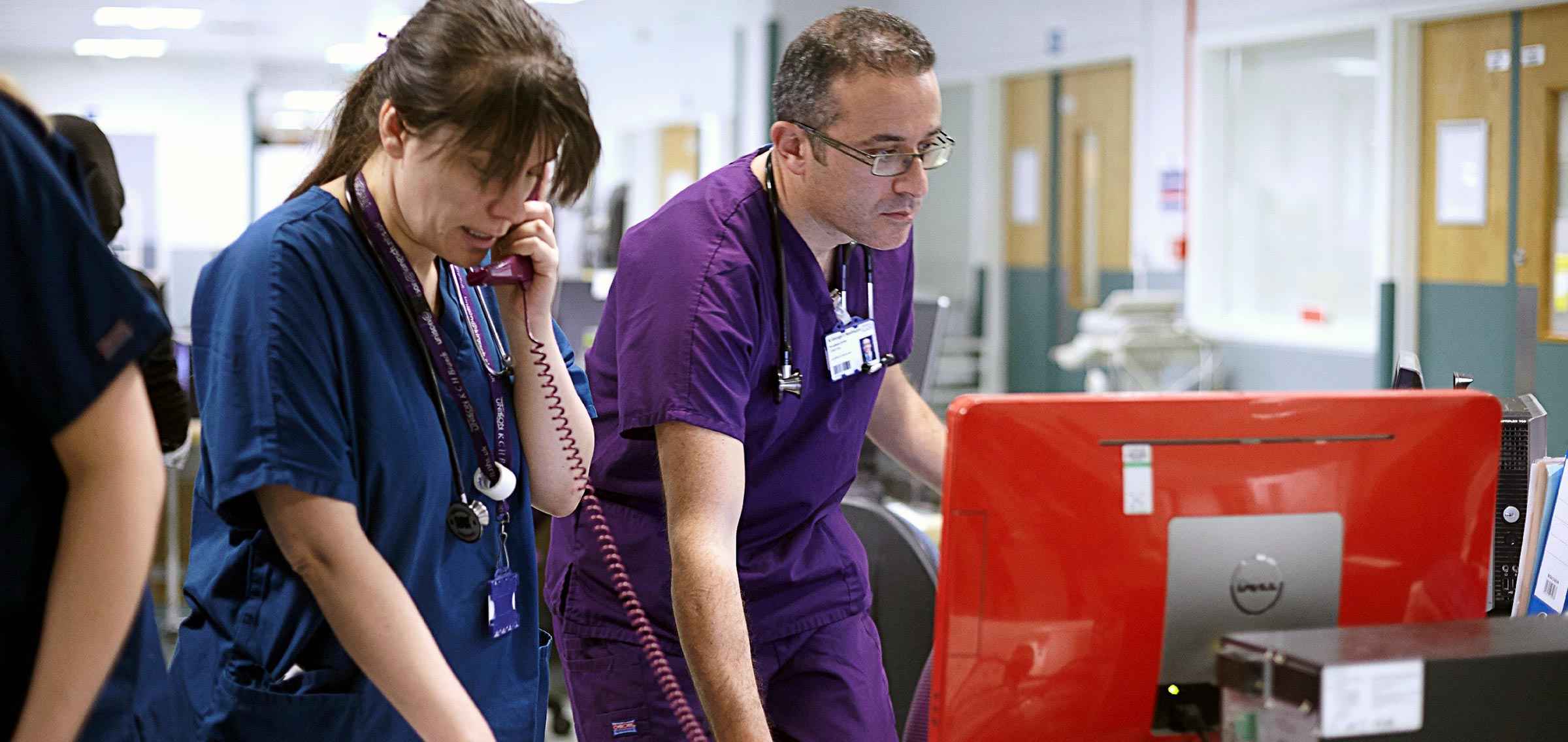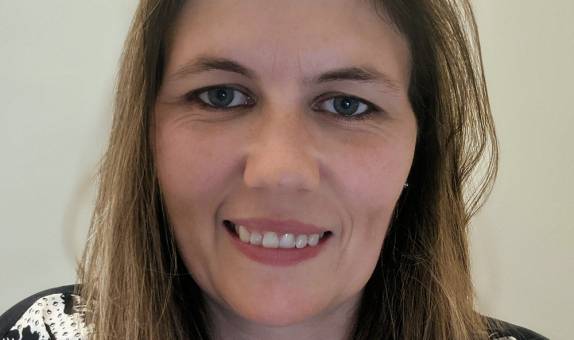Healthcare Practice BSc (Hons) top-up / GradCert
Why choose this course?
Are you a healthcare practitioner looking to take the next steps in your career? This course will develop your skills and knowledge and give you a qualification to confirm your expertise.
You may have a DipHE / FdSc (or other comparable Level 5 qualification) that you want to 'top up' to gain a BSc (Hons) award. Work-based learning and specialist modules can suit your needs and background. You'll need 120 credits at Level 6 for the BSc (Hons), accumulated over two to four years.
If you already hold a degree-level qualification, there are clinically-focused graduate certificates in specialist areas available. For the Grad Cert, you'll need an undergraduate degree and an additional 60 credits at Level 6, accumulated over one-to-two years.
| Qualification | Attendance | Apply | Year of entry |
|---|---|---|---|
| BSc (Hons) top-up | 2 years part time | Apply online* | 20242025 |
| GradCert | 1 year part time | Apply online* | 20242025 |
The GradCert Healthcare Practice has specialist areas of Cardiac Care, Children's Critical Care, Intensive Care, Neonatal Critical Care and Independent / Supplementary Prescribing.
Reasons to choose Kingston University
- Kingston is No.1 in London and No.6 in the UK overall for nursing and midwifery (Guardian league tables 2022).
- Modules usually last five to ten weeks, with one taught study day per week. The BSc (Hons) top-up course offers a personalised plan of study.
- Modules can be tailored to give you the learning that suits your career aspirations.
What you will study
For the BSc (Hons) top-up you will study one core Service Improvement module, totalling 30 credits. There is a range of optional modules from which to select the remaining 90 credits to personalise learning to your sphere of professional practice, career aspirations and service needs.
Module selection for the GradCert depends on which clinically-focused award you elect to undertake.
Core module
Option modules: 15 credits
Option modules: 30 credits
Option modules: 60 credits
Core module for BSc Healthcare Practice
BSc Honours Service Improvement Project
30 credits
This is the compulsory module for nurses and other registered healthcare professionals who wish to obtain the BSc (Hons) Healthcare Practice award. The module will enable participants to develop their understanding of a variety of research methods, to competently critique contemporary research evidence and to identify research questions that will enable the development of their own clinical practice through the planning of a service improvement.
15-credit option modules
12 Lead ECG Interpretation
15 credits
This module is suitable for nurses and others registered healthcare professionals wishing to develop their ability to use a 12 Lead Electrocardiogram (ECG) as an assessment tool in clinical practice. It will enable students to gain confidence in ECG interpretation through the development of knowledge relating to cardiac physiology, the principles of electrocardiography and the criteria associated with conditions commonly observed on the ECG.
Adult Critical Care Polytrauma: Assessment and Management
15 credits
This module is suitable for experienced adult critical care nurses and other healthcare practitioners involved in the care of polytrauma patients during their critical care phase. The module learning outcomes are aligned to the National Competency Framework for Adult Critical Care Nurses: Trauma.
Applied Neonatal Pathophysiology
15 credits
This module is the first of four modules for healthcare practitioners working full-time or part-time within the neonatal unit that will enable the practitioner to be recognised as qualified in speciality (QIS). It is also designed as a stand-alone module for neonatal healthcare practitioners wishing to update their knowledge and skills. The delivery of neonatal care is dependent upon the clinical skills of the practitioner, and the sound theoretical underpinning of neonatal anatomy, physiology and pathophysiology. This module will provide the novice neonatal practitioner with the necessary grounding in applied neonatal pathophysiology in which to develop and further their evidence-based practice.
Applied Pathophysiology in the Management of Children requiring Acute and High Dependency Care
30 credits
This module can be taken standalone or as a core module for practitioners wishing to specialise in PICU and obtain Qualification in Speciality (QiS). The delivery of acute and high-dependency care for children is dependent upon a sound theoretical knowledge of developmental anatomy, physiology and its pathophysiology. This module will enable practitioners to apply these principles to the care of children and young people with common paediatric conditions and congenital defects in acute and highly dependent settings.
Cardiac Arrhythmias: Interpretation and Management
15 credits
This is the compulsory module for nurses and other registered healthcare professionals who wish to obtain the BSc (Hons) Healthcare Practice award. The module will enable participants to develop their understanding of a variety of research methods, to competently critique contemporary research evidence and to identify research questions that will enable the development of their own clinical practice through the planning of a service improvement.
High Dependency Neonatal Care
15 credits
This module is the third of four modules for nurses and other registered healthcare professionals working in the neonatal unit that will enable the practitioner to be recognised as qualified in speciality (QIS). The delivery of neonatal care to the high dependency infant is dependent both on the clinical skills of the practitioner and the development and maintenance of therapeutic relationships with the parents and the multi-disciplinary team through the use of appropriate communication and interpersonal skills. The development of the above has assumed even greater importance as the boundaries in intensive care and high dependency blur due to improvements in respiratory care. In order to recognise the deteriorating neonate, the module content will be system and assessment led to identify appropriate management strategies. This module further facilitates the development of reflective skills in order to provide and analyse the care for a high dependency baby and family.
Minor Illness: Assessment and Management
15 credits
This module is for nurses and other registered healthcare professionals who wish to develop skills and knowledge in the holistic assessment and evidence-based treatment of patients with minor health problems in first contact, urgent and primary care settings.
Minor Injury Management
15 credits
This module is for nurses and other registered healthcare professionals who wish to develop knowledge and skills in managing minor injuries in children and adults. It is intended to develop practice through the efficient use of resources and enable practitioners to manage patients presenting to urgent and primary care settings with minor injuries.
Neonatal Intensive Care
15 credits
This module is the fourth and final module for nurses and other registered healthcare professionals working in the neonatal unit that, upon completion, will enable the practitioner to be recognised as qualified in speciality (QIS). The delivery of neonatal care to the intensive care infant is dependent both on the clinical skills of the practitioner and the development and maintenance of therapeutic relationships with the parents and the multidisciplinary team using appropriate communication and interpersonal skills. This module facilitates the development of reflective skills to provide and critically analyse the care for an intensive care baby and family.
Neonatal Special and Transitional Care
15 credits
This module is the second of four modules for nurses and other registered healthcare professionals working within the neonatal unit that will enable the practitioner to be recognised as qualified in speciality (QIS). The delivery of neonatal care to the special care infant is dependent both on the clinical skills of the healthcare practitioner and the development and maintenance of therapeutic relationships with the parents and the multidisciplinary team through the use of appropriate communication and interpersonal skills, with the ultimate aim of facilitating the transition of the infant and family from hospital to home. It also facilitates the development of reflective skills in order to provide and analyse the care to a special care baby and family.
Respiratory Care for the Acute Setting
15 credits
This module is suitable for nurses and other registered healthcare professionals working with respiratory patients in an acute setting. It is designed to equip students with the knowledge and skills to assess and manage patients with acute respiratory presentations.
Trauma Care: Initial Assessment and Management
15 credits
This module is suitable for nurses and other registered healthcare professionals directly involved in the emergency care of polytrauma patients. A range of traumatic injuries will be explored but the focus will be upon initial assessment and management of these patients in the context of the emergency department. The module learning outcomes, indicative content and assessment strategy are aligned to the National Major Trauma Nursing Group (NMTNG) National Curriculum and Competency Framework (NMTNG 2016)i and The National Service Specification for Major Trauma (NHS England 2013).
Work Based Learning (15 credits)
15 credits
This module is designed for registered healthcare practitioners who are undertaking or are about to undertake work-based projects e.g., clinical audit, producing clinical guidelines, role development or in-service study programmes. It can also be used for the recognition of prior experiential learning (RPEL), which has been undertaken in employment within the past five years. The module offers a flexible approach with the negotiation of a bespoke learning agreement between the participant, clinical supervisor/ employer and module leader, which identifies the work-based activities to be used and presented in a written form for assessment and the award of academic credit.
30-credit option modules
Acutely Unwell Adult
30 credits
This module is suitable for nurses and other registered healthcare practitioners who wish to develop their knowledge and skills in caring for acutely ill patients. Using a flexible, technology enhanced approach, this core module will enable the practitioner to deliver high quality, evidence-based care which focuses on the timely recognition, effective assessment, and appropriate management of this challenging patient group.
Adult Critical Care: Patient Assessment
30 credits
This module is for nurses working in level 3 adult critical care areas and will equip students with the necessary knowledge and skills to undertake and interpret a comprehensive assessment of an adult patient with complex care needs. It is intended to build on the knowledge and skills previously gained from achievement of the Step 1 Competencies, part of the National Competency Framework for Registered Nurses in Adult Critical Care (2015). When taken in conjunction with the Adult Critical Care Patient Management module, these modules meet the requirements for the Step 2 and Step 3 competencies which form part of the National Standards for Adult Critical Care Nurse Education (2016).
Adult Critical Care: Patient Management
30 credits
This module is for nurses working in Level 3 adult critical care areas and will explore the management of complex conditions seen in Level 3 patients, using contemporary evidence and patient-centred care. It is intended to build on the knowledge and skills previously gained from achievement of the Step 1 Competencies, part of the National Competency Framework for Registered Nurses in Adult Critical Care (2015). When taken in conjunction with the Adult Critical Care Patient Assessment module, these modules meet the requirements for the Step 2 and Step 3 competencies which form part of the National Standards for Adult Critical Care Nurse Education (2016).
Anaesthetic Practice
30 credits
This module is suitable for registered healthcare professionals working in the perioperative environment who wish to develop a career in anaesthetics to enhance the care given to patients in the operating department.
Applied Pathophysiology in the Management of Children requiring Acute and High Dependency Care
30 credits
This module can be taken standalone or as a core module for practitioners wishing to specialise in PICU and obtain Qualification in Speciality (QiS). The delivery of acute and high-dependency care for children is dependent upon a sound theoretical knowledge of developmental anatomy, physiology and its pathophysiology. This module will enable practitioners to apply these principles to the care of children and young people with common paediatric conditions and congenital defects in acute and highly dependent settings.
Cardiac Care: Patient Assessment and Management
30 credits
This module is suitable for nurses and other registered healthcare professionals working with adult patients in a range of acute clinical settings including cardiology, cardiac surgery, acute medicine and emergency care. The module will equip the practitioner with the essential skills to rapidly assess acutely unwell cardiac patients and the knowledge to inform individualised, evidence-based care.
Clinical Reasoning in Health Assessment: Lifespan Perspectives
30 credits
This module will enable nurses, midwives and other registered healthcare practitioners to develop their knowledge and skills in clinical reasoning and physical examination techniques. Healthcare practitioners are provided with the opportunity to equip themselves to deliver a high standard of care in health assessment techniques, critically explore differential diagnosis and develop management plans that are evidence based and in partnership with their client group. The emphasis of the module is on integrating subjective and objective data into the clinical reasoning process and on synthesis of evidential practice in the context of undifferentiated urgent care. The educational delivery and ethos of this module emphasises and builds on autonomous self-directed learning for independent practice.
Critically Ill Child
30 credits
This module is suitable for nurses and other registered healthcare professionals wishing to expand their existing paediatric critical care knowledge and skills, and to enable them to care holistically for Level 3 critically ill children and young people. A particular emphasis is placed on developing clinical competencies and understanding the principles of organ failure and organ support, or its withdrawal. It will enable practitioners to provide evidence-based care for Level 3 critically ill children and young people and their families.
Emergency Practice
30 credits
This module is suitable for nurses and other registered healthcare practitioners working in the Emergency Department who wish to develop their knowledge and skills in caring for patients attending the ED. A variety of areas reflecting the diverse nature of emergency care are covered, including trauma; mental health; paediatrics; minor injuries, and contemporary professional issues. The module learning outcomes, indicative content and assessment strategy are aligned to the Royal College of Nursing / Emergency Care Association (ECA) National Curriculum and Competency Framework (NCCF) (RCN, 2017).
Examination of the Newborn
30 credits
The module will enable midwives and other registered healthcare professionals to explore issues related to examination and assessment of the newborn baby. The module is designed to enable participants to develop competence which will lead to autonomous practice in the examination and assessment of the newborn and to make appropriate referrals in accordance with the Newborn & Infant Physical Examination Standards 2021.
General Practice Nursing: Fundamentals of Care
30 credits
This module is suitable for nurses wishing to gain a foundation in the knowledge and skills required to provide evidence-based care within a primary care setting. The module content reflects the diverse nature of this area of practice and includes the exploration of contemporary professional issues, screening and health promotion, skills-based competencies and the management of long-term conditions.
High Dependency Issues in Maternity Care
30 credits
This module is intended for midwives/nurses working in an obstetric unit and will enable participants to explore issues related to the provision of care to women and birthing people in high dependency situations. The module will enable the participants to reflect on their current skills developing further skills as necessary. Inter-professional working will be highlighted
Independent/Supplementary Prescribing for Nurses and Midwives (V300)
30 credits
The Independent and Supplementary Prescribing module is suitable for NMC registrants from all fields of nursing practice (adult, mental health, learning disabilities and children's nursing), midwifery and specialist community public health nursing (SCPHN). It builds on existing physical assessment and clinical reasoning skills, to develop the practitioners' pharmacology knowledge base, as well as the theory and practice of prescribing to meet the NMC Standards for prescribing programmes (NMC, 2018). The module is delivered using a blended learning approach, which incorporates both face-to-face and online activities. A variety of strategies and techniques are employed, including simulation-150 based learning, to encourage critical enquiry and problem solving, in recognition of the complexities that may be encountered in prescribing practice. The module forms the second part of the Graduate Certificate in Independent/ Supplementary Prescribing award, with the first part comprising the ‘Clinical reasoning in health assessment: lifespan perspectives' module, or equivalent 30 credits at Level 6.
Perinatal Mental Health
30 credits
This module will enable midwives and other registered healthcare professionals to critically appraise the intersectionality of the socio-political, racial, economic and cultural context of the care of women and birthing people with antenatal and postnatal mental health problems. It will look at the history and underlying paradigms that inform care and approach this from a feminist and critical social theory perspective. It will equip students with the knowledge, skills and attitudes to meet current challenges in improving outcomes for vulnerable and disadvantaged families and to critique services in order to advocate for them. It will enable students to understand the importance of providing effective high-quality care through effective interprofessional collaboration and development of managed care pathways.
Post Anaesthetic Care: Principles and Practice
30 credits
This module is for nurses and other registered healthcare professionals working in the post-anaesthetic care unit (PACU) of main operating theatres or day surgery environments, who wish to develop the knowledge and skills required to give appropriate and effective care to patients recovering from surgery and anaesthesia.
Professional Advocate
30 credits
This module is designed for health and social care professionals who have been locally selected to act as professional advocates. The professional advocate role is underpinned by the Advocating-Educating for Quality ImProvement model (NHS, 2017). This model supports health and social care staff to evaluate their working environment through a continuous improvement process and to support individuals to build professional resilience.
Renal Dialysis: Principles of Care
30 credits
This module is for nurses and other registered healthcare professionals who wish to become competent and informed in the care and management of service users receiving renal replacement therapy, either haemodialysis (HD) or/and peritoneal dialysis (PD). It will also enhance knowledge in relation to the care and treatment of acute kidney injury. The focus of the module is on assessment, intervention and evaluation of pre, intra and post dialysis.
Renal Dysfunction: Complexities of Care
30 credits
This module is for nurses and registered healthcare professionals who wish to become competent and knowledgeable in relation to the pathophysiology of renal dysfunction. It offers a sound basis for the overall care management strategies, including transplantation, for this client group. The module incorporates pathophysiological, psychosocial, ethical, legislative, professional guidance and risk management dimensions to provide a flexible and in-depth understanding of the spectrum of living with renal dysfunction.
Theatre Practice
30 credits
This module is suitable for registered healthcare practitioners working in the perioperative environment who wish to build on their knowledge and skills in theatre practice.
Work Based Learning (30 credits)
30 credits
This module is designed for registered healthcare practitioners who are undertaking or are about to undertake work-based projects e.g., clinical audit, producing clinical guidelines, role development or in-service study programmes. It can also be used for the recognition of prior experiential learning (RPEL), which has been undertaken in employment within the past 5 years. The module offers a flexible approach with the negotiation of a bespoke learning agreement between the participant, clinical supervisor/ employer and module leader, which identifies the work-based activities to be used and presented in a written form for assessment and the award of academic credit.
60-credit option modules
Work Based Learning (60 credits)
60 credits
This module is designed for registered healthcare practitioners who are undertaking or are about to undertake work-based projects e.g., clinical audit, producing clinical guidelines, role development or in-service study programmes. It can also be used for the recognition of prior experiential learning (RPEL), which has been undertaken in employment within the past five years. The module offers a flexible approach with the negotiation of a bespoke learning agreement between the participant, clinical supervisor/ employer and module leader, which identifies the work-based activities to be used and presented in a written form for assessment and the award of academic credit.
Please note
Optional modules only run if there is enough demand. If we have an insufficient number of students interested in an optional module, that module will not be offered for this course.
GradCert Healthcare Practice
60 credits at Level 6: any modules.
GradCert Cardiac Care
60 credits at Level 6; must include:
- 12 Lead ECG Interpretation (15 credits)
- Cardiac Arrhythmias: Interpretation and management (15 credits)
- Cardiac Care: Patient Assessment and Management (30 credits)
GradCert Intensive Care
60 credits at Level 6; must include:
- Adult Critical Care; Patient Assessment (30 credits)
- Adult Critical Care: Patient Management (30 credits)
GradCert Children's Critical Care
60 credits at Level 6; must include:
- Applied Pathophysiology in the management of children requiring Acute and High Dependency Care (30 credits)
- Critically Ill Child (30 credits)
GradCert Neonatal Critical Care
60 credits at Level 6; must include:
- Applied Neonatal Pathophysiology (15 credits)
- Neonatal Special and Transitional care (15 credits)
- High Dependency Neonatal Care (15 credits)
- Neonatal Intensive Care (15 credits)
GradCert Independent / Supplementary Prescribing for Nurses and Midwives
60 credits at Level 6; must include:
- Clinical reasoning in health assessment: lifespan perspectives
- Independent / Supplementary prescribing for nurses and midwives (V300)
Future Skills
Knowledge to give you the edge
Embedded within every course curriculum and throughout the whole Kingston experience, Future Skills will play a role in shaping you to become a future-proof graduate, providing you with the skills most valued by employers such as problem-solving, digital competency, and adaptability.
As you progress through your degree, you'll learn to navigate, explore and apply these graduate skills, learning to demonstrate and articulate to employers how future skills give you the edge.
At Kingston University, we're not just keeping up with change, we're creating it.

Entry requirements
Teaching and assessment
Students learn through a variety of learning, teaching and assessment strategies which require them to critically analyse, evaluate and reflect on their practice experiences in the workplace. Due to the interprofessional nature of this course, you will have opportunities to discuss the wide range of challenges within the healthcare profession. You will gain practical skills, such as advanced decision making, creative problem solving and critical thinking.
Who teaches this course?
Our academic team of highly skilled nurses, lecturers and researchers are known for innovation in teaching and learning.
Course fees and funding
Additional costs
Depending on the programme of study, there may be extra costs that are not covered by tuition fees which students will need to consider when planning their studies. Tuition fees cover the cost of your teaching, assessment and operating University facilities such as the library, access to shared IT equipment and other support services. Accommodation and living costs are not included in our fees.
Where a course has additional expenses, we make every effort to highlight them. These may include optional field trips, materials (e.g. art, design, engineering), security checks such as DBS, uniforms, specialist clothing or professional memberships.
After you graduate
This course will help you:
- Develop your practical skills and knowledge.
- Lead changes and improvements into practice.
- Develop expertise in your clinical role.
- Move to a more senior role.
- Gain confidence and advanced communication skills in the workplace.
Course changes and regulations
The information on this page reflects the currently intended course structure and module details. To improve your student experience and the quality of your degree, we may review and change the material information of this course. Course changes explained.
Programme Specifications for the course are published ahead of each academic year.
Regulations governing this course can be found on our website.








